
Supreme Court’s 'Say Sorry' Orders For Comedians Put Free Speech on Trial
Refusing to apologise even if one believes their speech is protected can entail significant legal repercussions.

advertisement
The Supreme Court has once again disappointed while dealing with a case involving online speech. In what has become a familiar playbook, it has yet again chosen to create artificial jurisprudential sidelines and by-lanes, in effect creating a separate standard of free speech and expression for podcasters and influencers. While seeking a public apology from comedians for a joke they made online on disability, the court observed that freedom of speech and expression can't be applicable to "commercial speech" if it is hurting the sentiments of other communities.
On 25 August 2025, a division bench of Justices Surya Kant and Joymalya Bagchi directed comedians Samay Raina, Vipul Goyal, Balraj Paramjeet Singh Ghai, Nishant Jagdish Tanwar, and Sonali Thakkar to tender unconditional apologies on their social media platforms, including YouTube. The directive arose from a petition filed by the Cure SMA Foundation, which alleged that the comedians made derogatory remarks about individuals suffering from Spinal Muscular Atrophy (SMA) and other disabilities, trivialising their struggles and mocking expensive treatment options.
This recent statement by the SC needs to be read in light of another distinct but related incident.
Apology without Adjudication
On 18 February 2025, an SC bench bench of Justices Surya Kant and N Kotiswar Singh granted YouTuber Ranveer Allahbadia, also known as Beer Biceps, interim protection from arrest following multiple First Information Reports (FIR) registered against him in Mumbai, Guwahati, and Jaipur. The cases against him pertained to the offence of obscenity stemming from remarks he made during an episode of the "India's Got Latent" online show. The court's relief came with stringent conditions, including one prohibiting him from airing any other show until further court orders.
During the hearing, Justice Kant severely admonished Allahbadia, describing his language as "dirty" and "perverted," and remarking that it would bring shame to "parents", "sisters and daughters," and "entire society". The Court questioned whether his comments constituted "cheap publicity" and highlighted the apparent absence of content warnings or disclaimers, unlike similar programs in other societies. Allahbadia's counsel argued that the show was restricted to paid adult subscribers and that the controversy erupted from a leaked 10-second clip.
The Court sought an apology even before fully adjudicating if the speech in question was constitutionally protected, implicitly accepting the premise of its offensiveness without a complete legal determination.
This pre-emptive demand for an apology, prior to a thorough examination of the speech in question against Constitutional safeguards, can be seen as problematic. Such an approach has the potential to short-circuit the judicial process of determining protected expression.
'Commercial Speech' is Also Expression
Furthermore, a critical aspect of the Court's commentary focused on the 'commercial' nature of the speech. Justice Bagchi is reported to have stated, "It’s not just freedom of speech but the question is of commercial speech. When we talk of commercial speech, then there is no freedom there".
The assertion that commercial speech represents a significant departure from established jurisprudence. It essentially forfeits the Constitutional protection safeguarded under Article 19(1)(a).
The court’s approach to commercial speech has undergone a significant shift from exclusion to recognition under Article 19(1)(a). Initially, in Hamdard Dawakhana vs Union of India (1960), the Court took the view that commercial advertisements, being motivated by profit, fell within the doctrine of res extra commercium - activities outside the scope of Constitutional protection - and hence were excluded from the ambit of free speech.
However, this restrictive approach was reconsidered in Tata Press Ltd vs MTNL (1995), where the Court acknowledged that advertising and commercial expression play a vital role in disseminating information, facilitating consumer choice, and supporting the freedom of trade and business.
The Court unambiguously held that expression iof speech does not forfeit Constitutional protection merely because it also constitutes ‘commercial speech.’ Turning back the clock on this jurisprudential advance to foist a reduced standard of protection for monetised online content requires a more serious and cautious approach.
Compelled Speech: A Faustian Bargain
The Court's exercise of its powers in these instances also invites scrutiny concerning potential abuse and the right against compelled speech. In Bijoe Emmanuel vs State of Kerala, (1986), the Court had recognised the right against compelled speech under Article 19(1)(a).
The case involved three schoolchildren belonging to the Jehovah’s Witnesses faith who respectfully stood but refused to sing the national anthem during school assemblies, as their religious beliefs prohibited them from singing.
The highest court's authority can place individuals in a position where refusing to apologise, even if they believe their speech is protected, entails significant legal repercussions, effectively stripping them of their autonomy of expression.
This creates a situation where an individual in need of the Court's protection from the State's harassment (such as facing multiple FIRs across different jurisdictions) is left with little option but to offer a compelled apology, thus entering a faustian bargain.
The apology, then, becomes a coerced act rather than a genuine admission of wrongdoing (even assuming there is wrongdoing), particularly problematic when commission of the offence, if any, has not been fully adjudicated. This powerful leverage, used to compel speech, particularly an apology, raises concerns about the court acting as speech police and potentially undermining the very freedoms it is tasked to protect.
(Prasanna S is an Advocate-on-Record in the Supreme Court and assists the Petitioners in the Ram Ramaswamy petition. This is an opinion piece. The views expressed above are the author’s own. The Quint neither endorses nor is responsible for them.)
- Access to all paywalled content on site
- Ad-free experience across The Quint
- Early previews of our Special Projects
Published: undefined